- Home
- Anthony Burgess
The Malayan Trilogy
The Malayan Trilogy Read online
CONTENTS
Cover
About the Book
About the Author
Also by Anthony Burgess
Title Page
Introduction
Time for a Tiger
Dedication
Disclaimer
Chapter 1
Chapter 2
Chapter 3
Chapter 4
Chapter 5
Chapter 6
Chapter 7
Chapter 8
Chapter 9
Chapter 10
Chapter 11
Chapter 12
Chapter 13
Chapter 14
Chapter 15
Chapter 16
Chapter 17
The Enemy in the Blanket
Epigraph
Disclaimer
Chapter 1
Chapter 2
Chapter 3
Chapter 4
Chapter 5
Chapter 6
Chapter 7
Chapter 8
Chapter 9
Chapter 10
Chapter 11
Chapter 12
Chapter 13
Chapter 14
Chapter 15
Chapter 16
Chapter 17
Chapter 18
Chapter 19
Chapter 20
Beds in the East
Epigraph
Disclaimer
Chapter 1
Chapter 2
Chapter 3
Chapter 4
Chapter 5
Chapter 6
Chapter 7
Chapter 8
Chapter 9
Chapter 10
Glossary
Copyright
ABOUT THE BOOK
Victor Crabbe is a well meaning, ineffectual English schoolteacher in the tropics, keen to teach the Malays what the West can do for them. In Time for a Tiger, The Enemy in the Blanket and Beds in the East Burgess lays bare the absurdities, conflicts and confusions of the dog days of Empire.
ABOUT THE AUTHOR
Anthony Burgess was born in Manchester in 1917. He served in the army from 1940 to 1954 before becoming a colonial education officer. It was while he held this post that doctors told him he would die, and he decided to try to live by writing. A prolific and respected author, Burgess died in 1993.
ALSO BY ANTHONY BURGESS
NOVELS
The Right To An Answer
The Doctor Is Sick
The Worm And The Ring
Devil Of A State
One Hand Clapping
A Clockwork Orange
The Wanting Seed
Honey For The Bears
Inside Mr Enderby
Nothing Like The Sun: A Story of Shakespeare’s Love-Life
The Eve Of Saint Venus
The Vision Of Battlements
Tremor Of Intent
Enderby Outside
MF
Napoleon Symphony
The Clockwork Testament; Or, Enderby’s End
Beard’s Roman Women
Abba Abba
Man Of Nazareth
1985
Earthly Powers
The End Of The World News
Enderby’s Dark Lady
The Kingdom Of The Wicked
The Pianoplayers
Any Old Iron
The Devil’s Mode (short stories)
A Dead Man In Deptford
Byrne
AUTOBIOGRAHY
Little Wilson And Big God
You’ve Had Your Time
FOR CHILDREN
A Long Trip To Teatime
The Land Where The Ice Cream Grows
THEATRE
Oberon Old And New
Blooms Of Dublin
VERSE
Moses
NON FICTION
English Literature: A Survey For Students
They Wrote In English (for Italian schools)
Language Made Plain
Here Comes Everybody: An Introduction To James Joyce For The Ordinary Reader
The Novel Now: A Student’s Guide To Contemporary Fiction
Urgent Copy: Literary Studies
Shakespeare
Joysprick: An Introduction To The Language Of James Joyce
New York
Hemingway And His World
On Going To Bed
This Man And Music
Homage To Quert Yuiop
A Mouthful Of Air
TRANSLATION
The New Aristocrats
The Olive Trees Of Justice
The Man Who Robbed Poor Boxes
Cyrano de Bergerac
Oedipus The King
EDITOR
A Shorter Finnegans Wake
The Grand Tour
Coaching Days of England
Anthony Burgess
The Malayan Trilogy
Time for a Tiger
The Enemy in the Blanket
Beds in the East
INTRODUCTION
Malaya, or the Federated Malay States, was the last major territory to achieve total independence of British control, and I, as a colonial officer in Malaya and Borneo from 1954 until 1960, was an eyewitness and also participant in the somewhat painful, somewhat comic, processes which brought it about.
Strictly speaking, Malaya was never a British colony in the sense that the North American territories were before 1776, or India was until its postwar partition. In the early nineteenth century the British East India Company had a trading post on the island of Penang and a fort called Butterworth on the mainland. The true East Indian colonists were the Dutch, but, when the Dutch and their overseas possessions came under the rule of Napoleon, it became necessary for the British to extend their sway, for the protection of trade routes, in the coastal areas of Malaya. Stamford Raffles, an East India Company clerk, exhibited that British gift for improvisation which had not yet been codified and solidified by a Colonial Office in London, and made out of an uninhabited mangrove swamp called Singapore a great port and trading depot. This, and Malacca – a decayed Portuguese colony whose harbour was silting up – and Penang became the only Malayan territories which flew the British flag, and their collective title was the Straits Settlements. The mainland of Malay was never ruled directly by the British at all.
Malaya consisted of a number of sultanates or rajahdoms which, except for Negri Sembilan, professed Islamic law and, in a somewhat eccentric way, subscribed to the Islamic religion. The Malays, a brown, handsome, lazy, wholly attractive race, had been converted to Islam by Arab traders but had a very vague idea of the origins of this conversion. Malay history seems to think that Alexander the Great, helped by Aristotle, had been the fount of it. The fact remained that, at the time of Raffles, Moslem sultans or rajahs ruled small kingdoms of Malays, but, because of the trouble caused by rebels, pirates and robber barons, they were anxious to have their authority stiffened by a British presence. This meant the availability of British soldiers and warships, as well as the setting up of a British Adviser in each of the Malay states. After the Second World War, during which the occupying Japanese ruled tyrannically, the Malays looked forward to a political independence for which, through training in the democratic processes, the British were very willing to prepare them. Kuala Lumpur, the centre of British administration, was to become the capital of a free federation of Malay states ruled over nominally by a sultan elected from the existing sultans. Singapore was to organise her own political future; Malacca and Penang were to join the federation. This is the situation as presented in my novel, which covers roughly the period from 1955 to 1957, the year of independence.
The Malays, who are mostly immigrants, historic or p
rehistoric, from such East Indian territories as Sumatra and Java, call themselves ‘the sons of the soil’ and consider that they are the only rightful inhabitants of the Malay peninsular. Political rule is totally in their hands, but they show little talent for industry and commerce. These activities, as well as the running of offices and railways, have traditionally and gladly been assumed by immigrants from China and India. The wealth of Malaya was always in the hands of the Chinese; Tamils and Bengalis and Sikhs took on posts in the Civil Service or in communications and the police force. One of the most attractive aspects of Malayan life, in the period of which I write, was the profusion of race and culture and language. But the races did not always get on well together. The Malays resented Chinese wealth and were determined to keep the Chinese out of politics. They despised the Indians and had derisive names for them. They even despised the English, whom they called ‘Mat Salleh’ or ‘Holy Joe’. The situation since independence has often been dangerous, and there have been odd eruptions of racial riot. But Malaya has to be accepted as a multiracial territory and, through language and culture, the former presence of the not unkindly British has been well remembered.
My story is about the races of Malaya, as exemplified in characters who have, or had, counterparts in real life. Acting as a somewhat ineffectual buffer between Sikhs, Tamils, Eurasians, Chinese and Malays is Victor Crabbe, an education officer who has come to Malaya after the death of his first wife and his marriage to his second. He genuinely loves Malaya but seems powerless to help it along the peaceful road to self-determination. His progress is backward and leads to a death occasioned by a shocking revelation about his first wife. He is not untypical of the decent, well-equipped, well-meaning Englishmen who took on posts in the tropics. His second wife is not untypical of the British memsahib, who considered herself superior to the ‘natives’. The other characters may sometimes seem implausible, but the reader may be assured that such characters existed during the period of my term in Malaya.
The action takes place in Malay sultanates with invented names. I think it is now safe to declare identities. Crabbe starts off in Kuala Hantu (‘Ghost Estuary’) in the state of Lanchap: this is really Kuala Kangsar, the site of the famous Malay College, in the state of Perak. He moves to the east coast for the second book – to what is really Kota Baharu in Kelantan. In the final third of his story he is in an unnamed territory which may be identified with any part of the federation the reader wishes: it is a kind of Malaya in microcosm.
Fictitious or not, all the Malay states that abutted on the jungle were, during the period described, plagued by the activities of Chinese communist terrorists. These were young men and women, possessed of weapons left over from the war and animated by political ideals taken from Peking, who were determined to prevent Malaya’s emergence to parliamentary democracy and wished to see a communist Malaya ruled by Chinese. The situation was called the dzarurat – Arabic for ‘emergency’ – but it was really a war. The Malay Regiment, which combined British and Malay troops, was dedicated to ridding the jungles and villages of the terrorists, and the armed police force did its own share in burning out pockets of dissidence and violence. The police force is mentioned often in this book. It was a specially augmented organisation equipped for war as well for the keeping of civil order and it had a large number of police lieutenants, most of whom had served in the Palestine Police. The states were divided into police zones – circles and contingents – and titles of authority abounded with impressive initials. The conduct of the war was in the hands of so-called war committees, usually headed by the Mentri Besar or Prime Minister, the executive assistant of the ruler of the state. The war was resolved not in the Vietnam manner, with napalm and deforestation, but through the declaration of amnesties, the provision of free passages to communist China, the protection of rural Malaya throughout the creation of ‘new villages’ away from the jungle and the systematic freezing of supplies from the terrorists.
We have to understand the nature of the East, and also of Islam: we can no longer, since Vietnam, regard those far regions as material for mere fairy tales, like the popular but regrettable Sandokan. It was considered in America that, if my book had appeared earlier, it might have had some small effect on the attitude towards Orientals which, during the Vietnam adventure, vitiated any hope of American success. The Americans understood neither their friends nor their enemies. To many, the Far East hardly exists, except as material for televisual diversion. It is hoped that this novel, which has its own elements of diversion, may, through tears and laughter, educate.
Anthony Burgess
Time for a Tiger
DEDICATION
The Malay state of Lanchap and its towns and inhabitants do not really exist.
1
“EAST? THEY WOULDN’T know the bloody East if they saw it. Not if you was to hand it to them on a plate would they know it was the East. That’s where the East is, there.” He waved his hand wildly into the black night. “Out there, west. You wasn’t there, so you wouldn’t know. Now I was. Palestine Police from the end of the war till we packed up. That was the East. You was in India, and that’s not the East any more than this is. So you know nothing about it either. So you needn’t be talking.”
Nabby Adams, supine on the bed, grunted. It was four o’clock in the morning and he did not want to be talking. He had had a confused coloured dream about Bombay, shot with sharp pangs of unpaid bills. Over it all had brooded thirst, thirst for a warmish bottle of Tiger beer. Or Anchor. Or Carlsberg. He said, “Did you bring any beer back with you?”
Flaherty jerked like a puppet. “What did I tell you? What am I always saying? May God strike me down dead this instant if I wasn’t just thinking to myself as I came in that that’s the first bloody question you’d ask. Beer, beer, beer. For God’s sake, man, haven’t you another blessed thought in your head at all but beer? And supposing I had put a few bottles for myself in the fridge, don’t you think it would be the same as always? You lumbering downstairs with your great bloody big weight and that dog after you, clanking its bloody anti-rabies medal against the treads of the stairs, and you draining the lot of it before breakfast and leaving the bloody empties on the floor for any self-respecting decent man who keeps Christian hours to trip over. I did not bring any beer back, though those soldiers is generous to a fault and was for plying me with loads of the stuff and as much as you want, they said, any time you like and all at N.A.A.F.I. prices.”
Nabby Adams stirred on his bed and the dog beneath it stirred too, the medal on its collar chinking like money on the floor. Should he get up now and drink water? He shuddered at the thought of the clean, cold, neuter taste. But thirst seemed to grip his whole body like a fever. He levered himself up slowly, six feet eight inches of thirst, ghostlike behind the darned and frayed mosquito-net.
“I’m worried about you, Nabby,” said Police-Lieutenant Flaherty. “Worried to death. I was saying to-night that you’re not the person I made you into at the end of your last tour. By God, you’re not. By Christ, you’re back to the old days in Johore with the towkays round at the end of the month waving their bills round the office and me not able to go into a kedai at all for fear of the big bloody smarmy smiles on their yellow faces and they saying, ‘Where’s the big tuan?’ and ‘Has the big tuan got his pay yet, tuan?’ and ‘The big tuan has a big kira, tuan, and when in the name of God is he going to pay?’ Christ, man, I was ashamed of my white skin. You letting the side down like that. And I got you right. I got you clear. I got you on that bloody boat with money in your pocket. And now look at you.” Flaherty dithered in a palsy of indignation. “I’ve covered up for you, by God I have. There was the other day with the C.P.O. round and you on the beer again in that filthy bloody kedai where I’d be ashamed to be seen, boozing away with that corporal of yours. Leading him astray, and he a bloody Muslim.”
“You leave him alone,” said Nabby Adams. He was on his feet, a little unsteady, a huge hand stained with tobacco-tar
seeking support from the dressing-table. Gaunt, yellow-brown, towering, he moved another step. The black bitch came from under the bed and shook herself. Her medal clanked. Her tail stirred as she looked up, happy and worshipping, at the vast man in shrunken dirty pyjamas. “You leave him alone. He’s all right.”
“Christ, man, I wouldn’t touch him with my walking-stick. They’re talking, I tell you, about you letting the side down, slinking from kedai to kedai with your bloody corporal at your tail. Why don’t you mix a bit more with your own race, man? Some damn good nights in the Club and they’re the salt of the earth in the Sergeants’ Mess, and that fellow Crabbe was playing the piano the other night, a real good singsong, and all you do is prowl around looking for credit in dirty little kedais.”
“I do mix with my own race.” Nabby Adams was moving slowly towards the door. The dog stood expectant by the stairhead, waiting to escort him to the refrigerator. Her tail beat dully on the door of the bedroom of Police-Lieutenant Keir. “And you wouldn’t speak like that if you wasn’t tight.”
“Tight! Tight!” Flaherty danced on his bottom, gripping the chair-seat as if he thought it would take off. “Listen who’s talking about being tight. Oh, God, man, get wise to yourself. And make up your mind about what bloody race you belong to. One minute it’s all about being a farmer’s boy in Northamptonshire and the next you’re on about the old days in Calcutta and what the British have done to Mother India and the snake-charmers and the bloody temple-bells. Ah, wake up, for God’s sake. You’re English right enough but you’re forgetting how to speak the bloody language, what with traipsing about with Punjabis and Sikhs and God knows what. You talk Hindustani in your sleep, man. Sort it out, for God’s sake. If you want to put a loincloth on, get cracking, but don’t expect the privileges —/—” (the word came out in a wet blurr; the needle stuck for a couple of grooves) “the privileges, the privileges …”
Nabby Adams went slowly down the stairs. Clank, clank, clank came after him, and a dog’s happy panting. He switched on the light in the big, bare, dirty room where he and his brother officers ate and lounged and yawned over the illustrated papers. He opened the refrigerator door. He saw only chill bottles of water. In the deep-freeze compartment was a rich bed of snow with incrustations of month-old ice on the metal walls. He took a bottle of water and gulped down mouthful after mouthful, but the thirst abated not at all, rather the lust for a real drink mounted to an obscene pitch. What day was it? Confused, he wondered whether this was late in the night or early in the morning. Outside the smeared uncurtained windows was solid black, heavy and humid, and there was not a sound, not even a distant cock-crow. It was near the end of the month, of that he was sure, a day or two off at the most. Must be, because of the petrol returns. But then, what difference did that make? Gloomily he watched bills parade and curtsy before his inward eye.

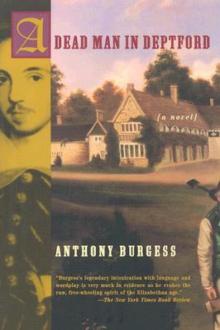 A Dead Man in Deptford
A Dead Man in Deptford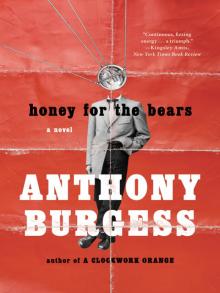 Honey for the Bears
Honey for the Bears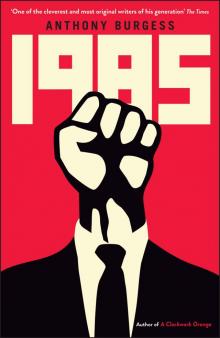 1985
1985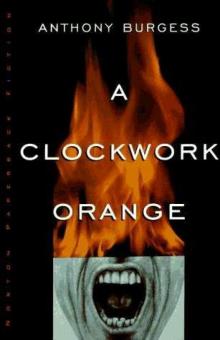 A Clockwork Orange
A Clockwork Orange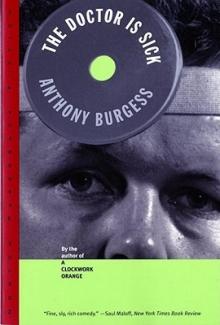 The Doctor Is Sick
The Doctor Is Sick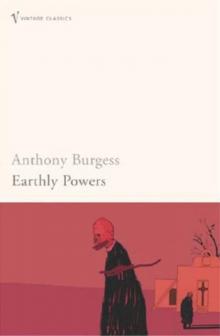 Earthly Powers
Earthly Powers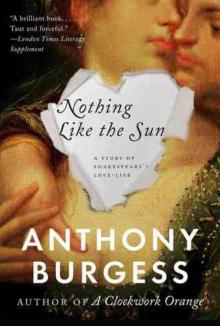 Nothing Like the Sun
Nothing Like the Sun Collected Poems
Collected Poems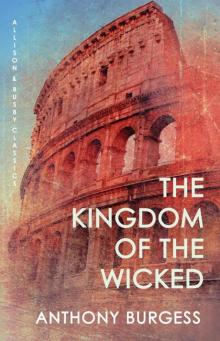 The Kingdom of the Wicked
The Kingdom of the Wicked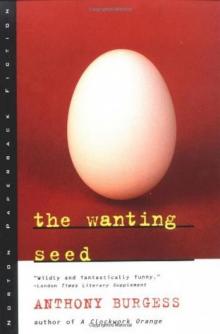 The Wanting Seed
The Wanting Seed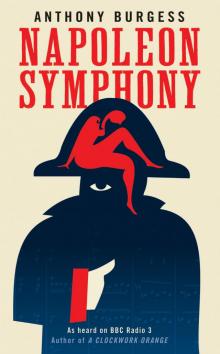 Napoleon Symphony
Napoleon Symphony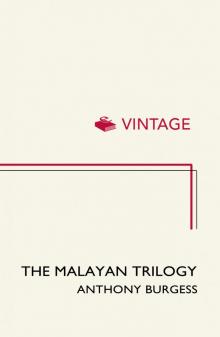 The Malayan Trilogy
The Malayan Trilogy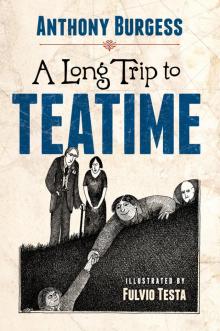 A Long Trip to Teatime
A Long Trip to Teatime Enderby Outside
Enderby Outside M/F
M/F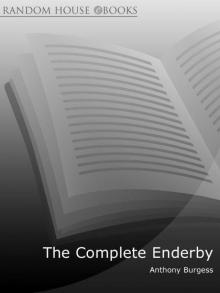 The Complete Enderby
The Complete Enderby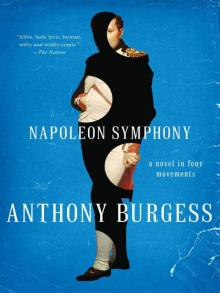 Napoleon Symphony: A Novel in Four Movements
Napoleon Symphony: A Novel in Four Movements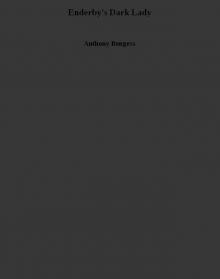 Enderby's Dark Lady
Enderby's Dark Lady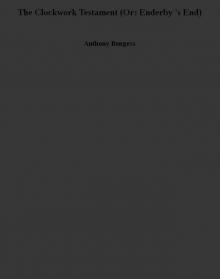 The Clockwork Testament (Or: Enderby 's End)
The Clockwork Testament (Or: Enderby 's End) ABBA ABBA
ABBA ABBA A Clockwork Orange (UK Version)
A Clockwork Orange (UK Version)